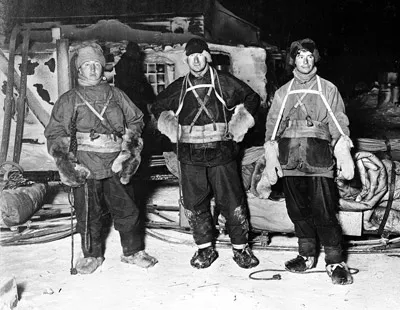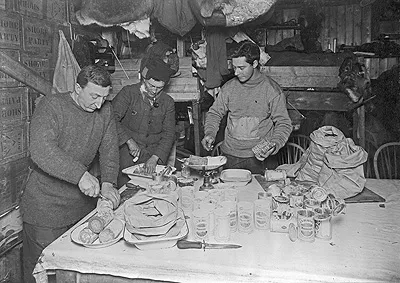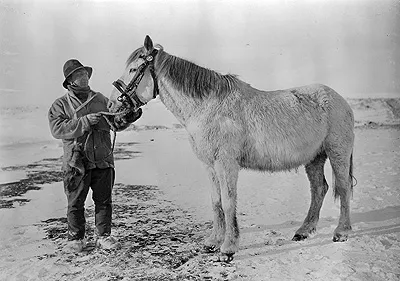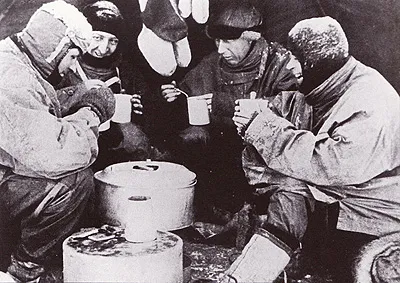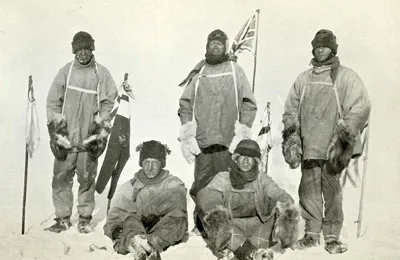Bowers, Henry Robertson "Birdie" - Lieutenant
(1883 -
1912)
Biographical notes
Storekeeper - Terra Nova 1910-13
Henry Bowers - Birdie
29th July 1883 - 29th March 1912
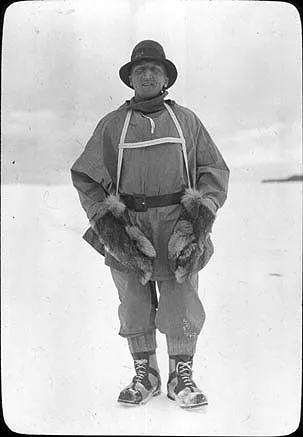 A
Scot, born in Greenock, Bowers father died when he was three,
his mother then moved the family to London. He became a sea
cadet and joined the navy serving in India before being recommended
to Scott by Sir Clements Markham being appointed without an
interview.
A
Scot, born in Greenock, Bowers father died when he was three,
his mother then moved the family to London. He became a sea
cadet and joined the navy serving in India before being recommended
to Scott by Sir Clements Markham being appointed without an
interview.
His role was originally that of storekeeper on the ship, but he soon proved he was capable of far more than this, he accompanied Cherry-Garrard and Wilson in their trip to Cape Crozier to retrieve an emperor penguin egg, famously written about in Cherry-Garrards book "The Worst Journey in the World".
Bowers was involved with depot laying in January-March 1911 as preparation for the south pole attempt later in the year. Starting in November 1911 he accompanied Scott's Polar Party by leading a pony called Victor pulling a sledge. When they set off, Bowers was one of the men who was to aid with supporting the South Pole attempt though not a part of the final party. Scott included him at the last minute when the last members of the support team turned back making him the 5th member of what had been planned logistically as a 4 man group, while the others had skis to stop them sinking in soft snow, Bowers didn't and had to walk. While he reached the South Pole, he died on the way back with Scott and Wilson in their tent, he was 29 years of age.
-
"Wilson and Bowers were found in the attitude of sleep,
their sleeping-bags closed over their heads as they would
naturally close them."
Known as "Birdie" for his distinctively shaped nose, he was a powerfully built man, just 5 feet 4 inches tall (1.63m), popular with his companions as hard working, endlessly cheerful, dependable and tough. He was a figure of some fascination for the other men by his habit of stripping naked outside every morning once they had arrived in the Antarctic, and throwing buckets of icy water and slush over himself to acclimatize himself for what was to come.
"The hardest traveller that ever
undertook a Polar journey as well as one of the most undaunted."
Scott
"There was nothing subtle about
him. He was transparently simple, straightforward, and unselfish"
Cherry-Garrard
References to Henry Bowers by Cherry-Garrard in "The Worst Journey in the World"
-
Bowers was proving himself the best seaman on board, with an exact knowledge of the whereabouts and contents of every case, box and bale, and with a supreme contempt for heat or cold.
-
Bowers also had shown seamanlike qualities which are an excellent test by which to judge the Antarctic traveller; a good seaman in sail will probably make a useful sledger: but at this time Scott can hardly have foreseen that Bowers was to prove "the hardest traveller that ever undertook a Polar journey, as well as one of the most undaunted." But he had already proved himself a first-rate sailor.
-
It must have been about this time that orders were given to clew up the jib and then to furl it. Bowers and four others went out on the bowsprit, being buried deep in the enormous seas every time the ship plunged her nose into them with great force. It was an education to see him lead those men out into that roaring inferno.
-
The Terra Nova proved a wonderfully fine ice ship. Bowers' middle watch especially became famous for the way in which he put the ship at the ice, and more than once Scott was alarmed by the great shock and collisions which were the result: I have seen him hurry up from his cabin to put a stop to it! But Bowers never hurt the ship, and she gallantly responded to the calls made upon her.
-
Against the south side of the hut Bowers built himself a store-room. "Every day he conceives or carries out some plan to benefit the camp.
-
Bowers was of a very different build. Aged 28, he was only 5 feet 4 inches in height while his chest measurement (which I give more as a general guide to his physique than for any other reason) was 40 inches, and his weight 12 stones. He was recommended to Scott by Sir Clements Markham, who was dining one day with Captain Wilson-Barker on the Worcester, on which ship Bowers was trained. Bowers was then home from India, and the talk turned to the Antarctic. Wilson-Barker turned to Sir Clements in the course of conversation and alluding to Bowers said: "Here is a man who will be leading one of those expeditions some day."
He lived a rough life after passing from the Worcester into the merchant service, sailing five times round the world in the Loch Torridon. Thence he passed into the service of the Royal Indian Marine, commanded a river gunboat on the Irrawaddy, and afterwards served on H.M.S. Fox, where he had considerable experience, often in open boats, preventing the gun-running which was carried on by the Afghans in the Persian Gulf. -
As he was one of the two or three greatest friends of my life I find it hard to give the reader a mental picture of Birdie Bowers which will not appear extravagant. There were times when his optimism appeared forced and formal though I believe it was not really so: there were times when I have almost hated him for his infernal cheerfulness. To those accustomed to judge men by the standards of their fashionable and corseted drawing-rooms Bowers appeared crude. "You couldn't kill that man if you took a pole-axe to him," was the comment of a New Zealander at a dance at Christchurch. Such men may be at a discount in conventional life; but give me a snowy ice-floe waving about on the top of a black swell, a ship thrown aback, a sledge-party almost shattered, or one that has just upset their supper on to the floorcloth of the tent (which is much the same thing), and I will lie down and cry for Bowers to come and lead me to food and safety.
-
For me it was a very bad night: a succession of shivering fits which I was quite unable to stop, and which took possession of my body for many minutes at a time until I thought my back would break, such was the strain placed upon it. They talk of chattering teeth: but when your body chatters you may call yourself cold. I can only compare the strain to that which I have been unfortunate enough to see in a case of lock-jaw. One of my big toes was frost-bitten, but I do not know for how long. Wilson was fairly comfortable in his smaller bag, and Bowers was snoring loudly. The minimum temperature that night as taken under the sledge was -69°; and as taken on the sledge was -75°. That is a hundred and seven degrees of frost.
References to Henry Bowers by Scott in "Scott's Last Expedition"
-
Bowers is wonderful. Throughout the night he has worn no head-gear but a common green felt hat kept on with a chin stay and affording no cover whatever for the ears. His face and ears remain bright red. The rest of us were glad to have thick Balaclavas and wind helmets. I have never seen anyone so unaffected by the cold. To-night he remained outside a full hour after the rest of us had got into the tent. He was simply pottering about the camp doing small jobs to the sledges, &c.
-
Bowers started out as usual in his small felt hat, ears uncovered. Luckily I called a halt after a mile and looked at him. His ears were quite white. Cherry and I nursed them back whilst the patient seemed to feel nothing but intense surprise and disgust at the mere fact of possessing such unruly organs.
-
In the middle of the night at 4.30 Bowers got out of the tent and discovered the ice had broken all round him: a crack ran under the picketing line, and one pony had disappeared. They had packed with great haste and commenced jumping the ponies from floe to floe, then dragging the loads over after - the three men must have worked splendidly and fearlessly. At length they had worked their way to heavier floes lying near the Barrier edge, and at one time thought they could get up, but soon discovered that there were gaps everywhere off the high Barrier face. In this dilemma Crean volunteering was sent off to try to reach me. The sea was like a cauldron at the time of the break up, and killer whales were putting their heads up on all sides. Luckily they did not frighten the ponies.
He travelled a great distance over the sea ice, leaping from floe to floe, and at last found a thick floe from which with help of ski stick he could climb the Barrier face. It was a desperate venture, but luckily successful. -
To Bowers' practical genius is owed much of the smooth working of our station. He has a natural method in line with which all arrangements fall, so that expenditure is easily and exactly adjusted to supply, and I have the inestimable advantage of knowing the length of time which each of our possessions will last us and the assurance that there can be no waste. Active mind and active body were never more happily blended. It is a restless activity, admitting no idle moments and ever budding into new forms.
-
In the evening Bowers gave his lecture on sledging diets. He has shown great courage in undertaking the task, great perseverance in unearthing facts from books, and a considerable practical skill in stringing these together. It is a thankless task to search polar literature for dietary facts and still more difficult to attach due weight to varying statements. Some authors omit discussion of this important item altogether, others fail to note alterations made in
practice or additions afforded by circumstances, others again forget to describe the nature of various food stuffs. -
Bowers insists on doing all camp work; he is a positive wonder. I never met such a sledge traveller.
-
Bowers is all and more than I ever expected of him. He is a positive treasure, absolutely trustworthy and prodigiously energetic. He is about the hardest man amongst us, and that is saying a good deal--nothing seems to hurt his tough little body and certainly no hardship daunts his spirit. I shall have a hundred little tales to tell you of his indefatigable zeal, his unselfishness, and his inextinguishable good humour. He surprises always, for his intelligence is of quite a high order and his memory for details most exceptional. You can imagine him, as he is, an indispensable assistant to me in every detail concerning the management and organisation of our sledging work and a delightful companion on the march.
-
Little Bowers remains a marvel--he is thoroughly enjoying himself. I leave all the provision arrangement in his hands, and at all times he knows exactly how we stand, or how each returning party should fare. It has been a complicated business to redistribute stores at various stages of re-organisation, but not one single mistake has been made. In addition to the stores, he keeps the most thorough and conscientious meteorological record, and to this he now adds the duty of observer and photographer. Nothing comes amiss to him, and no work is too hard. It is a difficulty to get him into the tent; he seems quite oblivious of the cold, and he lies coiled in his bag writing and working out sights long after the others are asleep.
-
Wilson and Bowers are my standby. I don't like the easy way in which Oates and Evans get frostbitten.
-
I don't know what I should do if Wilson and Bowers weren't so determinedly cheerful over things.
-
TO MRS. BOWERS
MY DEAR MRS. BOWERS,
I am afraid this will reach you after one of the heaviest blows of your life.
I write when we are very near the end of our journey, and I am finishing it in company with two gallant, noble gentlemen. One of these is your son. He had come to be one of my closest and soundest friends, and I appreciate his wonderful upright nature, his ability and energy. As the troubles have thickened his dauntless spirit ever shone brighter and he has remained cheerful, hopeful, and indomitable to the end.
The ways of Providence are inscrutable, but there must be some reason why such a young, vigorous and promising life is taken.
My whole heart goes out in pity for you.
Yours,
R. SCOTT.
To the end he has talked of you and his sisters. One sees what a happy home he must have had and perhaps it is well to look back on nothing but happiness.
He remains unselfish, self-reliant and splendidly hopeful to the end, believing in God's mercy to you.
Landmarks named after Henry Bowers
Feature Name: Mount Bowers
Type: Summit
Latitude: 85°00'00S
Longitude: 164°05'00E
Description: A peak, 2,430 m, standing 2 mi SSE of Mount Buckley, at the head of the Beardmore Glacier. Named by the British Antarctic Expedition (BrAE) (1910-13).
Feature Name: Bowers Mountains
Type: Summit
Latitude: 71°10'00S
Longitude: 163°15'00E
Description: A group of north-south trending mountains, about 90 mi long and 35 mi wide, bounded by the coast on the north and by the Rennick, Canham, Black and Lillie Glaciers in other quadrants. The seaward end was first sighted in February 1911 from the Terra Nova, under Lieutenant Harry L.L. Pennell, Royal Navy (RN), and subsequently named "Bowers Hills." The feature was photographed from U.S. Navy aircraft in 1946-47 and 1960-62, and was surveyed and mapped by U.S. Geological Survey (USGS) in 1962-63. The name was amended to Bowers Mountains upon U.S. Geological Survey (USGS) mapping which showed the group to be a major one with peaks rising to nearly 2,600 meters.
Feature Name: Bowers Piedmont Glacier
Type: Glacier
Latitude: 77°43'28S
Longitude: 164°13'51E
Description: Piedmont glacier on the coast of Victoria Land, covering about 40 square mi and lying just S of New Harbor. It merges at its S side with Blue Glacier. Discovered by the British National Antarctic Expedition (BrNAE) (1901-04), but not named until the British Antarctic Expedition (BrAE) (1910-13).
Other Crew of the Terra Nova Expedition
Abbot,
George Percy - Petty Officer, R.N. - 1, 2, N
Atkinson, Edward
L. - R.N. - surgeon, parasitologist - 1, 2, D, P, S
Balson,
Albert - Leading seaman, R.N.- 1, 2
Bowers,
Henry Robertson - Lieutenant - 1, 2, D, C,
Po
Browning,
Frank Vernon - Petty Officer - 1, 2, N
Campbell,
Victor - Lieutenant, R.N. - 1, 2, N
Cheetham,
Alfred B. - Boatswain (Bosun), R.N.R.
Cherry-Garrard,
Apsley - Assistant zoologist - 1, 2, D, C, S
Crean,
Tom - petty officer, R.N. - 1, 2, D, P, S
Debenham, Frank
- Geologist - 1, 2, iW, iiW
Dickason,
Harry - Able Seaman - 1, 2, N
Evans, Edgar - petty
officer, R.N. - 1, iW, Po
Evans, Edward R.G.R. - Lieutenant, R.N. "Teddy Evans" -
second in command, and Captain of the Terra Nova - 1, D, P
Girev
(Geroff), Dmitriy - Dog driver - 1, 2, D, P, S
Gran,
Tryggve - ski expert - 1, 2, D, iiW, S
Lashly, William
- chief stoker, R.N. - 1, 2, P, S
Levick,
G. Murray - Surgeon, R.N. - 1, 2, N
Lillie, Dennis Gascoigne - Biologist
on the ship
McLeod, Thomas
F. - Able seaman - 1, 2
Meares, Cecil
H. - in charge of dogs - 1, D, P
Oates, Lawrence
- Capt. 6th Iniskilling Dragoons - 1, D,
Po
Ponting,
Herbert G. - Camera artist - 1
Priestley,
Raymond E. - Geologist - 1, 2, N
Omelchenko,
Anton - Groom - 1
Scott, Robert
Falcon - Commander, R.N. -
Expedition leader - 1, D, Po
Simpson,
George - Meteorologist - 1
Taylor,
T. Griffith - Geologist - 1, iW, iiW
Wilson,
Edward Adrian - chief of scientific staff and biologist - 1, D, C,
Po
Wright,
Charles Seymour - Physicist - 1, 2, iW, P, S
Key:
1 - first winter
2 - second winter
iW - first western party
iiW - second western party
N - northern
party
D - depot laying for south pole journey
P - south pole party
C - winter journey to Cape Crozier
S - search party for south Pole
party
Po - reached
South Pole
Biographical information
- I am concentrating on the Polar experiences of the men involved.
Any further information or pictures visitors may have will be gratefully received.
Please email
- Paul Ward, webmaster.
What are the chances that my ancestor was an unsung part of the Heroic Age
of Antarctic Exploration?

